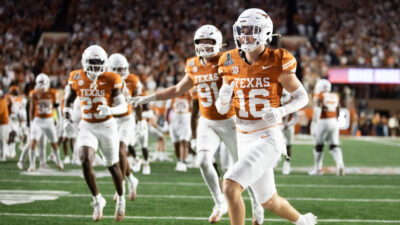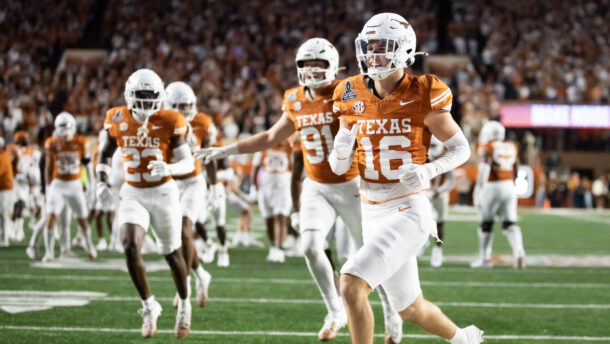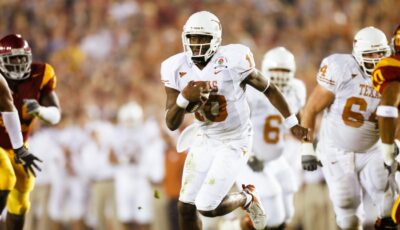As a football conference, the SEC nearly shut down in 1943 due to World War II, with many universities electing not to field a team.
Many of the best coaches and players in conference history served the country as a member of the United States Armed Forces, often electing to pause, damage or end college or professional football careers in sacrifice for our country.
Here are a few of the biggest football names with military ties, along with a summary of their service history.
The list of legendary SEC coaches, in particular, is dotted with high-ranking military officers, probably no coincidence.
General Robert Neyland: He turned down several offers to play professional baseball to serve the U.S. military in France during World War I. He later served on the U.S.-Mexican border in pursuit of Pancho Villa, and in India and China during World War II.
His efforts saw him promoted to regimental commander in the U.S. Army at just 27 years old, but he got demoted to captain when the New York Times reported that fact. Neyland protested, and as a result got shipped to MIT for post-graduate study in civil engineering, which eventually led to the architectural plans to expand Neyland Stadium.
Eventually Neyland got named head coach of the Tennessee football team, and got promoted to major in the U.S. Army Corps of Engineers just six days before his first game. Military service interrupted his career a few more times, as he served in 1935 at the Panama Canal Zone and then during the Second World War from 1941-45.
According to UTsports.com, “commands during the war years took him to Dallas; Kunming, China; and Calcutta (now Kolkata), India. Neyland received his final promotion to brigadier general on Nov. 10, 1944, when he was transferred to India.”
Neyland’s grandfather, Robert Reese Neyland, also served as a lieutenant colonel in the Confederate Army, getting killed in 1862 at the Battle of Shiloh in West Tennessee.
SEC Contributions: 173 wins, 5 SEC titles, 4 national championships as Tennessee’s coach.
Paul “Bear” Bryant: With the help of New York Yankees catcher Bill Dickey, following the 1941 season, Bryant got a formal offer to become Arkansas’ head football coach. Then the Japanese bombed Pearl Harbor on Dec. 7, 1941. The attack eventually led to U.S. involvement in World War II, but Bryant enlisted in the Navy the next day.
According to AL.com, Bryant was on board the USS Uruguay in North Africa when another ship rammed it. He then disobeyed orders to abandon ship and survived, while at least 200 others died.
In 1944, Bryant moved to North Carolina to train enlistees as a lieutenant commander. He also pieced together the Carolina Cloudbusters — the North Carolina Navy Pre-Flight School football team. Some of the players formed his nucleus at his first official NCAA coaching job with Maryland.
Bryant’s Cloudbusters quarterback, Otto Graham, won four championships with the All-America Football Conference and three with the National Football League.
SEC Contributions: 323 wins (some out of conference), 14 SEC titles and 6 national championships at Maryland, Kentucky, Texas A&M and Alabama.
Vince Dooley: There isn’t a wealth of available information about Dooley’s time in the Marine Corps, other than the fact that it served as a major influence on his coaching style.
Dooley enlisted for two years, after which he had several options: make a career out of the military, become a banker, become a high school football coach or become an assistant at Auburn.
In 2012, Dooley was inducted to the Marine Corps Sports Hall of Fame in Quantico, Va., celebrating former Marines “who have excelled both on and off the athletic playing field.”
SEC Contributions: 201 wins, 6 SEC titles, 1 national championship as Georgia’s coach.
John Vaught: Before he ever became a head coach, Vaught served as an assistant for the North Carolina Pre-Flight School football team in 1942. Then he served in World War II as a lieutenant commander in the United States Navy from ’43 to ’45.
SEC Contributions: 190 wins, 6 SEC titles, 3 national championships as Ole Miss’ coach.
Ralph “Shug” Jordan: One of 156,000 U.S. troops who stormed the beaches of Normandy on June 6, 1944, Jordan took a piece of shrapnel in the left shoulder and vanished. Fellow soldiers found him leaning against a piece of equipment in shock, and it took three days to get him help.
After surgery and rehab in England, Jordan returned to the First Engineer Special Brigade, an amphibious assault force. He participated in four major invasions, including North Africa (November 1942), Sicily (July 1943) and Okinawa (April 1945).
For his service, Jordan earned a Purple Heart and a Bronze Star. He eventually obtained the rank of major.
SEC Contributions: 176 wins, 1 SEC title, 1 national championship, 4x SEC Coach of the Year as Auburn’s coach.
Bob Suffridge: His pro career was cut short while he served as a lieutenant commander in the United States Navy during World War II, missing the seasons of ’42, ’43 and ’44. An All-Pro for the Philadelphia Eagles as a rookie, Suffridge played a game on Dec. 7 during the Pearl Harbor attack.
“That was the day I blocked three of Sammy Baugh’s punts,” Suffridge said, “but nobody paid any attention the next day. At halftime somebody had come into the dressing room and told us Pearl Harbor had been bombed by the Japs. I’d have been the hero of the day except for that.”
He joined the Navy immediately after those attacks. From a website dedicated to Fountain City history comes a great war story:
After he graduated from Officer Candidate School early in World War II, Suffridge was called to Washington for an interview before he was granted a commission. A trifle nervous, but full of self-confidence, he stood before a crusty Admiral who asked a few questions about his background, his athletic career and his academic achievements. Then the Admiral said, “Just why, Mr. Suffridge, do you think that you should be an officer in the United States Navy?”
Taken aback, Suffridge thought a minute or so then said, “Well, sir, back during the Civil War all of my relatives fought for the South. If we hadn’t run out of rocks we would have beaten those d— Yankees.” The dead silence told Suff that he had committed a grave error. Finally with fire flashing from his eyes the Admiral said, “Mr. Suffridge, the Yankees won the war and now we are all Yankees.” “That’s right sir,” Suffridge answered, “But those d— Rebels gave us Yankees hell for a little while, didn’t they?”
As the ranking officer on a troop transport, he suffered only a shrapnel wound to his right leg, but went from a 25-year-old in peak condition to an out-of-shape 30-year-old when he rejoined the Eagles.
SEC Contributions: Suffridge was a two-time All-American lineman for the Tennessee Volunteers in 1939 and 1940.
Bob Gain: In 1954, he served as a first lieutenant in the U.S. Air Force in Korea.
The Air Force agreed to let him fly to Cleveland to play games on Sundays at the request of revered coach Paul Brown, but Gain declined. He got an offer to play for Washington while maintaining service in the military and turned it down. The Air Force then asked him to play football on their team. Again Gain said no. That’s when they shipped him to Korea.
“I didn’t want any special treatment and I would deck anyone who said I got special treatment,” Gain said. “I feel good about it. I feel good when a veteran kisses my cheek or shakes my hand. If I had played football I couldn’t have looked them in the eye. I lost friends in the war and I had to fulfill my obligation.
“I guess they just didn’t get it. I told them send me anywhere you want, I’m not playing football till I get out fair and square.”
After his separation date, he rushed to play in the ’54 NFL championship game for the Browns, helping Cleveland beat the Detroit Lions, 56-10.
SEC Contributions: Gain was a two-time All-American tackle for the Kentucky Wildcats in 1949 and 1950.
Frank Sinkwich: As a member of the United States Marine Corps after college, Sinkwich received a medical discharge due to flat feet and “a football knee.” He later joined the United States Merchant Marines and the United States Army Air Forces, suffering a significant knee injury playing football for the latter. His knee got in the way of his professional football career after World War II ended.
SEC Contributions: Sinkwich was a two-time All-American halfback for the Georgia Bulldogs in 1941 and 1942.
Glen Coffee: After a strong rookie NFL season backing up Frank Gore for the San Francisco 49ers, Coffee went through OTAs and training camp in 2010 before abruptly retiring just before the start of the season. Coffee told reporters he felt God wanted him to take a different path, and he returned to the University of Alabama hoping to finish his degree in consumer affairs.
In February 2013, Coffee enlisted in the U.S. Army to become a paratrooper, graduating from Army Airborne School in June of that year.
From a ’13 Deadspin story:
Coffee drifted around for awhile. He started boxing. He got baptized, and spoke at churches. He was arrested for weapons possession. (Charges were later dropped.) He went back to Alabama to finish his degree. He played semi-pro football. But it was only after seeing Tears of the Sun, starring Bruce Willis as the leader of a squad of Navy SEALS, did he decide to join the military. He enlisted in February. After today’s graduation, it’s off to Fort Bragg, where Coffee hopes to become a Green Beret.
SEC Contributions: Coffee rushed for 1,383 yards on 5.9 yards per carry in 2008, earning first-team All-SEC honors in his best season as an Alabama running back.
An itinerant journalist, Christopher has moved between states 11 times in seven years. Formally an injury-prone Division I 800-meter specialist, he now wanders the Rockies in search of high peaks.







